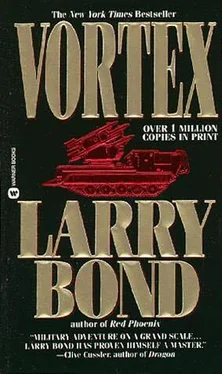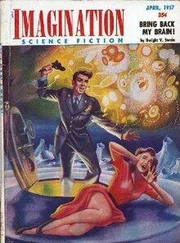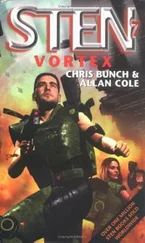Only the SAMs were radar directed.
He had been inspecting the radar van, talking to the technicians who were trying to somehow coax the balky electronics back to life. It was difficult enough to keep one of these things working in normal times, and these times were anything but normal.
Their discussion had been interrupted by the sound of an explosion directly overhead, and the van had been rocked by a thousand hammers beating on the roof. Several holes had been punched through, and the zinging fragments had ruined several pieces of equipment and wounded the senior technician.
Everyone had piled into the emplacement dug for the wheeled van, but
Korster had taken one moment to look at the shredded antenna, tilted crazily off the vertical. A failed relay was now the least of its problems.
They had been hit by an anti radar missile, and without the radar to warn them of the missile carrier’s approach, they had been unable to turn it off in time. It appeared the Americans had called his bluff.
The radar was dug in on a small hill that not only gave it excellent coverage, but now afforded a ringside seat on the attack below. Jet aircraft, in pairs or flights of four, appeared over the ridges and hills. Rolling inverted as they passed over the crest lines, they would approach from different directions, sometimes separated only by seconds, it seemed.
Korster watched as they bombed the equipment parks and antiaircraft sites. The SAM launchers seemed to be getting special attention from the fighters. He saw one or two missiles launched, probably in optical mode, but they failed to hit anything, and that was all the response the unready crews could muster.
The manmade storm lasted about fifteen minutes. Korster waited two or three minutes to see if there were any later waves of attackers, but finally decided that the raid was over. He looked over the town. A gray haze covered large sections, the still morning air holding the smoke overhead. Several fires burned, and he could see two of his precious SAM launchers lying on their sides. Scattered figures wandered around, still in a daze.
He had to get down there and see what was left. Turning to the senior technician, he saw that the man, a beefy sergeant, was sitting upright, being bandaged by one of his coworkers. Korster started to tell the sergeant to check the radar van for new damage when he heard a chattering sound to the southwest.
It sounded as if his antiaircraft guns were firing again, and he was ready to dive for cover again when one of the men pointed.
OVER LADY SMITH
General Garrick watched the assault from five thousand feet up and two miles back. It was close enough, with effort, to see individual men through his binoculars.
His headset, tuned to the frequency of the attack aircraft, allowed him to follow the aircrafts’ preparatory attacks, as well as their escape without casualties. The first wave of gunships had been timed to hit within a minute of the last jet’s attack, and for the most part, they made it.
Coming in low, the Apaches raced toward pre briefed targets that had been found on the reconnaissance photos. The South Africans were recovering quickly, he noticed. Flak emplacements sent streams of tracers up, forcing the gunships to jink and dive. One gun, opening up on the flank of the oncoming choppers, caught a machine and slammed several rounds into the tail boom. Its anti torque rotor out, the aircraft spun twice then slammed into the ground.
Returning fire with rockets, missiles, and chain guns, the gunships suppressed any location that opened fire. Garrick had heard the assault commander declare the LZ “cold,” and still in formation, the slicks started coming in. The Apaches and scout helicopters moved off to predetermined areas, covering both the landing zone and the town itself.
“General, we’re at bingo fuel.” The voice in his headphones pulled him back from the landing zone to his noisy metal perch. Helicopters could not stay airborne forever, and the pilot had a long way to go.
“Right. Take me to the division’s forward command post, please.” Garrick sighed. Oh, well, once the men were out of the slicks there would be little to see from the air anyway.
LADY SMITH
Korster and his technicians watched the landing and the right from their hilltop. Since the initial attack on their position, the enemy had not molested them, and Korster and the others
had maintained a low profile. Three more R4 rifles and a pistol were not going to influence events below.
The small group hugged the earth and watched as wave after wave of
American helicopters landed and disgorged soldiers and heavy equipment.
The firing in town started almost immediately, with Korster listening on the field telephone to the surprised garrison commander’s orders to dig in and hold in place.
The South African defenders numbered no more than a weak battalion, but they knew the town and refused to budge from a building until they were blown out or killed in place.
Korster visualized the Americans advancing up Poorte Street, and he heard his colonel radio the order to abandon the Royal Hotel, one of the buildings being used to billet the men. He waited, hoping that the defenders would somehow hold, but it was clear who the eventual victor would be. The kommandant gave them another hour at most.
He stood up suddenly, surprising the other men.
“Come on, we have work to do.”
The technicians looked at him with amazement. They had followed and discussed the progress of the American attack. They had seen gunships and other helicopters fly directly over the ruined van. What did he think he was doing?
“The sergeant needs to have his wound tended. I want every document shredded and piled in the center of the radar van. We will burn them and the van with them and deny both to the enemy.”
For him, the fighting was over. He’d see what the Americans could do with this land.
JANUARY 2-44TH PARACHUTE BRIGADE REACTION FORCE, NEAR SKERPIONENPUNT
Maj. Rolf Bekker burrowed farther under the camouflage awning he’d rigged over his foxhole and then lay motionless-imitating other animals he’d seen survive the desert’s bone-dry air and sun-drenched heat. Movement meant sweat. Sweat was lost water. And water was life.
His watch alarm beeped softly. Time for another drink.
He uncapped his third canteen and took a careful swig, swishing the body-temperature liquid around the inside of his mouth before swallowing.
Despite the flat metallic tang imparted by the canteen itself, the water tasted good. And it felt good trickling down his parched throat. He recapped the canteen and hooked it to his web gear.
Still thirsty, Bekker settled back to wait. It was ironic, though a self-imposed irony. While he and his three hundred paratroops rationed their precious water mouthful by mouthful, one of South Africa’s two significant rivers, the Oranje,
lay only eight kilometers away-flowing northwest on its way toward the
Atlantic. Eight kilometers south, that was all. Only a brisk two hours’ walk, perhaps less.
Right now, though, the river might just as well have been on the far side of the moon. His own strict orders kept his men under cover in their fighting positions.
There was a good reason for that. Bekker’s northernmost outposts were already reporting dust rising in the distance. Henrik Kruger’s renegade battalion was coming south down the only road he’d left open and apparently unguarded. In reality, the men of the 20th Cape Rifles were being lured right into a killing zone.
The Afrikaner major studied his handpicked battlefield through slitted eyes. If anything, the brown, barren valley seemed even more suited to his purposes now than it had when he’d ringed it on the map.
Читать дальше












